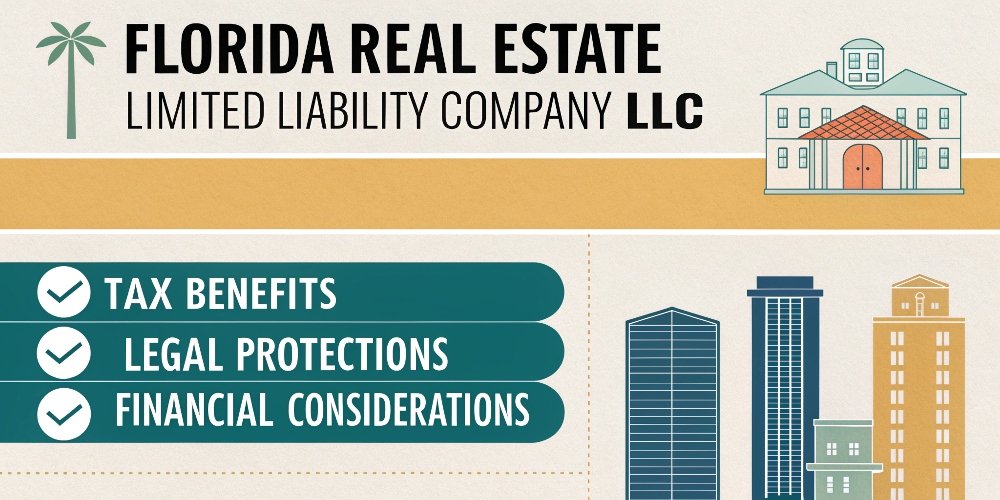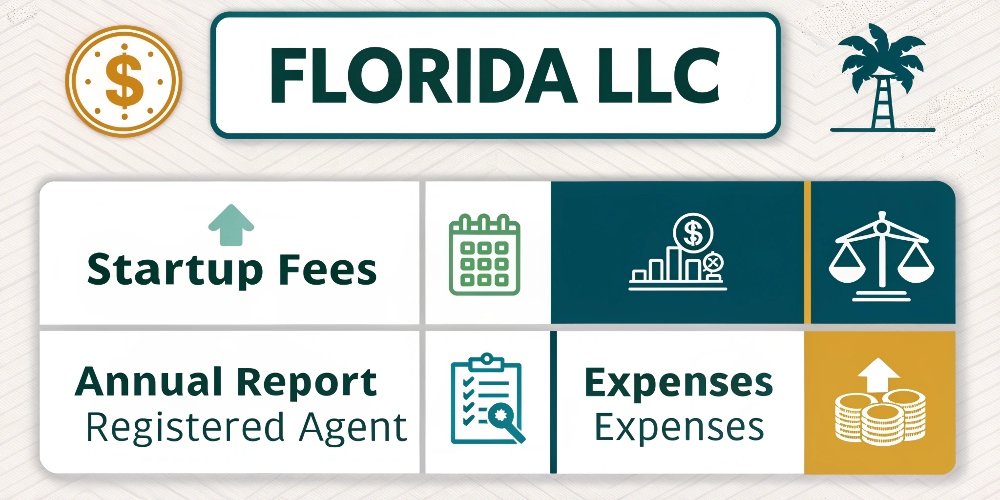Owning real estate in Florida offers many opportunities, whether for personal residence, rental income, or long-term investment. As property values continue to rise across the state, many homeowners and investors consider different ways to protect their assets and reduce their liabilities. One of the most common strategies is placing a property, including a primary or secondary residence, into a Limited Liability Company, also known as an LLC. This decision involves careful consideration of legal, financial, and tax implications.
The question of whether to put your Florida home in an LLC is not straightforward. It depends on various factors, including the purpose of the property, your personal financial goals, and the legal protections you are seeking. Some property owners see it as a strategic move to shield personal assets from lawsuits, while others are concerned about the potential costs and administrative responsibilities. This article explores every aspect of placing a Florida home into an LLC, providing homeowners and investors with the full context needed to make an informed decision.
Understanding What an LLC Is and Why People Use It for Real Estate
A Limited Liability Company is a legal business structure that offers protection against personal liability. This means that if the LLC faces legal action or debts, the personal assets of the members, such as personal bank accounts or cars, are generally protected. The LLC structure combines the flexible management style of a partnership with the liability protection similar to a corporation.
In real estate, LLCs are commonly used to hold rental properties, commercial buildings, or vacation homes. Property owners use LLCs to separate their personal wealth from their real estate investments. By doing so, they aim to reduce the risks associated with lawsuits, property damage claims, or tenant disputes. LLCs also make it easier to transfer property ownership, split profits among multiple investors, and streamline estate planning.
Why Florida Homeowners Consider Putting Their Property in an LLC
Florida homeowners often explore the LLC option for asset protection purposes. Florida is a state known for having a high number of lawsuits, partly due to its population size and economic activity. Property owners worry about potential legal claims resulting from accidents, injuries on the property, or disputes with contractors. By placing a home into an LLC, the owner may reduce the chances of their personal assets being targeted in such cases.
Another reason for using an LLC is privacy. In Florida, real estate ownership is part of the public record. If a home is owned by an individual, anyone can look up the owner’s name and property details. Some owners prefer to keep their identity private by purchasing and holding property under the name of an LLC. This approach helps protect privacy and makes it harder for potential litigants to identify the homeowner as a financial target.
The Benefits of Putting a Florida Home in an LLC
One of the primary benefits of using an LLC to hold real estate is liability protection. If someone is injured on your property and decides to sue, the lawsuit would typically target the LLC rather than you personally. This separation can shield personal assets from legal claims related to the property. However, it is important to maintain proper insurance and follow legal guidelines to ensure this protection remains valid.

Another advantage is estate planning flexibility. When a home is owned by an LLC, it is easier to transfer ownership interests to heirs or other family members. Instead of going through the traditional probate process, you can assign membership shares in the LLC. This can help reduce legal costs, simplify asset distribution, and minimize conflicts among family members after your passing.
Using an LLC for Rental or Investment Properties in Florida
For investment properties, using an LLC is often a smart decision. If the Florida home is used as a rental property or vacation rental, the liability risks increase significantly. Tenants, guests, or maintenance workers could get injured on the premises, leading to lawsuits that may exceed the limits of a standard homeowner’s insurance policy. By placing the rental property in an LLC, owners add an extra layer of protection.
Additionally, rental properties generate income, and managing that income through an LLC can simplify bookkeeping and financial reporting. Many investors find it easier to keep track of expenses, tax deductions, and profits when the property is held under a separate business entity. This separation of personal and business finances makes the management of rental properties more efficient and organized.
Challenges of Putting a Primary Residence in an LLC
While there are clear advantages for investment properties, putting a primary residence into an LLC presents unique challenges. Florida offers a strong homestead exemption that protects homeowners from forced sale by creditors in certain situations. This exemption can provide significant property tax benefits and legal protections, but transferring a homestead into an LLC may cause you to lose these protections.
Most lenders do not allow primary residences with mortgages to be transferred into an LLC without first paying off the loan. This is because transferring ownership may trigger the due-on-sale clause, allowing the lender to demand full repayment of the mortgage. Even if the property is owned outright, giving up the homestead status could lead to higher property taxes and reduced legal protections against creditors.
How Florida’s Homestead Exemption Affects LLC Ownership
The Florida Constitution grants a homestead exemption that protects a primary residence from most types of creditors. This exemption also provides a substantial property tax discount for eligible homeowners. However, the homestead exemption is only available to natural persons, not to business entities like LLCs. If you transfer your primary residence into an LLC, you will no longer qualify for this exemption.
Losing the homestead exemption could lead to a significant increase in annual property taxes. The tax cap on assessed value increases would no longer apply, potentially raising the property’s taxable value substantially. Furthermore, without the homestead exemption, the property could be vulnerable to judgments from creditors, which undermines one of the key protections Florida provides to homeowners.
Financing and Mortgage Considerations When Using an LLC
Transferring property into an LLC can complicate financing arrangements. Most residential mortgages are underwritten based on the personal income and creditworthiness of the borrower, not the LLC. If you already have a mortgage on your home, transferring it into an LLC without the lender’s consent can violate the loan terms. This may lead the bank to call the loan due immediately.
If you plan to purchase a home directly through an LLC, you may need to seek commercial financing. Commercial mortgages often have higher interest rates, larger down payment requirements, and shorter loan terms compared to residential loans. These factors can make financing more expensive, which is an important consideration before deciding to place a home into an LLC structure.
Tax Implications of Holding Florida Real Estate in an LLC
LLCs are generally considered pass-through entities for tax purposes. This means that the profits and losses from the property flow directly to the members, who report them on their personal tax returns. For rental properties, this structure allows owners to claim deductions for expenses such as repairs, maintenance, and depreciation. Managing taxes through an LLC can provide certain organizational benefits.

However, for personal residences, placing the home into an LLC may eliminate the ability to claim certain tax benefits. The IRS allows individuals to exclude up to two hundred and fifty thousand dollars of gain from the sale of a primary residence, or five hundred thousand dollars for married couples filing jointly. If the property is owned by an LLC, this exclusion may no longer apply, which could lead to a higher tax bill upon selling the home.
Insurance Considerations for LLC-Owned Properties
Insurance is another important factor to consider when placing a Florida home in an LLC. Traditional homeowner’s insurance policies are designed for personal property ownership, not business entities. Once a property is transferred into an LLC, the insurance company may require a commercial property or landlord policy, especially if the property is rented out.
These policies often cost more than standard homeowner’s insurance but provide broader protections suitable for business entities. Proper insurance coverage is crucial to maintaining the liability protections an LLC offers. If the LLC does not have appropriate insurance, a court may pierce the corporate veil, holding the members personally liable for claims.
Privacy Advantages of Using an LLC for Florida Property
Privacy is a significant reason why some Florida homeowners choose to hold property in an LLC. Real estate ownership records in Florida are public, making it easy for anyone to find out who owns a property. By using an LLC, the property is listed under the company name, not the individual’s personal name. This makes it more difficult for individuals to discover your real estate holdings.
For high-net-worth individuals, celebrities, or people with personal security concerns, this privacy can be valuable. However, creating an LLC does not guarantee complete anonymity. Florida requires LLCs to disclose the name and address of a registered agent and file annual reports that may include member or manager information. Using a third-party registered agent can help maintain some degree of privacy.
Estate Planning Benefits of Using an LLC
Estate planning is another area where LLC ownership can be advantageous. Transferring property to heirs through an LLC can simplify the process, avoiding probate and reducing legal costs. Instead of transferring the property itself, you can transfer membership interests in the LLC. This method makes it easier to divide ownership among multiple beneficiaries without triggering complicated legal procedures.
LLCs also allow for more flexible management of property after the owner’s death. Operating agreements can specify how the property will be managed, who has decision-making authority, and how profits or expenses are handled. This level of control is often not possible with traditional property ownership, making the LLC an appealing tool for estate planning.
Costs of Forming and Maintaining a Florida LLC
While forming an LLC in Florida is relatively straightforward, it is not free. The initial filing fee for a Florida LLC is one hundred and twenty-five dollars, and the annual report filing fee is one hundred and thirty-eight dollars and seventy-five cents. These costs are manageable for most homeowners but should be factored into the overall decision-making process.

There may also be additional expenses such as hiring an attorney to draft an operating agreement or consulting with a tax advisor to understand the implications. Some homeowners may choose to hire a registered agent service to maintain privacy and ensure legal compliance. These ongoing costs, while not excessive, represent a commitment that property owners must be prepared to handle.
Potential Risks and Drawbacks of Using an LLC
Despite the advantages, there are risks involved in transferring a Florida home into an LLC. One of the biggest risks is the possibility of losing key tax benefits or legal protections like the homestead exemption. There is also the risk of administrative errors, such as failing to maintain the LLC properly, which could result in the loss of liability protections.
Improper handling of finances between personal accounts and the LLC can lead to what is known as piercing the corporate veil. This legal concept allows courts to disregard the LLC’s protections if the company is not operated as a separate entity. Maintaining strict separation between personal and business finances is essential to preserving the benefits of an LLC.
Consulting Legal and Financial Professionals Before Making a Decision
Given the complexities involved in placing a Florida home into an LLC, consulting with legal and financial professionals is highly recommended. An attorney can help determine whether the transfer is appropriate based on your specific circumstances. A tax advisor can help you understand the potential tax consequences and how to structure the LLC for maximum benefit.
Every situation is unique. For some, the advantages of asset protection and estate planning outweigh the drawbacks. For others, especially those using the property as a primary residence, the risks of losing the homestead exemption and favorable tax treatment may not be worth it. Professional guidance ensures that you make the decision with a clear understanding of the consequences.
Conclusion: Should You Put Your Florida Home in an LLC?
Deciding whether to place your Florida home in an LLC depends on your goals, the property’s use, and your personal financial situation. For rental or investment properties, using an LLC often makes sense due to the liability protections and management flexibility it offers. For a primary residence, however, the decision is more complicated due to the potential loss of homestead benefits, financing issues, and tax implications.
Understanding the full context of this decision is critical. Asset protection, privacy, estate planning, and tax efficiency are all factors to weigh carefully. Working with experienced legal and financial professionals helps you evaluate your options and choose the path that aligns best with your needs. Proper planning ensures that you maximize the benefits of LLC ownership while avoiding costly mistakes.
Author Bio
Fahad Rafi specializes in helping entrepreneurs with business formation and startup strategy. He is associated with Business Rocket. Connect with Fahad Rafi on LinkedIn.


